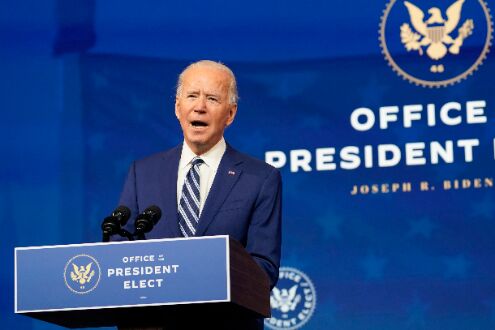Biden bill includes boost for union-made electric vehicles

Washington: President Joe Biden and Democrats in Congress are looking to give US automakers with union employees the inside track on the burgeoning electric vehicle market, triggering vocal opposition from foreign trade partners and Republicans who worry that manufacturers in their home states will be placed at a competitive disadvantage.
The USD 1.85 trillion spending package that Democrats are labouring to pass through Congress includes an array of programmes designed to curb global warming and slash US emissions. It includes incentives to hasten the transition to electric vehicles, which represent a small but rapidly growing share of the market.
If enacted, the bill would provide a USD 7,500 tax credit for consumers who buy electric vehicles through 2026. Beginning the following year, only purchases of electric vehicles made in the US qualify for the credit. The base credit goes up by USD 4,500 if the vehicle is made at a US plant that operates under a union-negotiated collective bargaining agreement. Only auto plants owned by General Motors Co., Ford Motor Co. and Stellantis NV qualify.
"I want those jobs here in Michigan, not halfway around the globe," Biden said when visiting a UAW job training centre last month.
The union-friendly add-on is raising hackles internationally and inside the US, testing the Democratic Party's commitment to a labour-friendly approach that Biden has made central to his political brand. The provision could boost the sale of electric vehicles while disadvantaging foreign automakers with US plants that employ tens of thousands of manufacturing workers, particularly in Southern states where laws have made it hard to unionise.
Democrats are undaunted. They say supporting union jobs is good for the economy and the country.
"I'm a student of America's economic history and labour unions have consistently helped build out the middle class," said Rep. Dan Kildee, D-Mich. "We should have a policy that's consistent with our values. Our values are that communities are stronger, the economy is stronger when workers have wages, benefits and protections that not only apply to them, but set the highest standard for all other employees."
But one key Democrat, Sen. Joe Manchin of West Virginia, spoke against the provision when visiting a Toyota plant in his home state Thursday. Automotive News quoted Manchin as saying that in a capitalistic economy, "you let the product speak for itself, and hopefully, we'll get that, that'll be corrected."
In the evenly divided Senate, Manchin's opposition could well prove fatal to the union-friendly tax credit.
Ambassadors from the European Union, Canada and South Korea are among those who recently wrote to congressional leaders saying the credit is inconsistent with US trade commitments and "tarnishes the spirit of trade laws that seek to establish the free and fair movement of goods."
Eleven governors complained that the more generous tax credit for cars made in union plants would punish companies and workers in their states. Republican lawmakers portray it as payback for a major Democratic benefactor, the United Auto Workers, which spent about USD 1.25 million in support of federal candidates in the 2020 elections, more than 99 per cent for Democratic candidates, according to OpenSecrets, which tracks campaign money.
Republican Sen. John Cornyn of Texas said he didn't expect a more generous tax credit for union-made cars to be decisive for car buyers, but said it will be a factor.
"There's nothing about a union-made electric vehicle that makes it greener than a nonunion vehicle, so it just seems pretty obvious it's funnelling money to supporters. I think it's shameful," said Cornyn, whose state was selected by Tesla for a manufacturing plant as well as for its new corporate headquarters.
"It's a terrible idea," said Sen. Roger Wicker, R-Miss, whose state is home to Nissan and Toyota plants.
All but the richest Americans would qualify for the tax credit, which would apply to vans, SUVs and pickups costing less than USD 80,000 and cars costing less than USD 55,000.
UAW President Ray Curry said in a statement supporting the bill that it would support "good paying union jobs and stands to benefit our country for decades to come."
"In addition, this framework encourages non-union manufacturers to let their workers freely organise," Curry said.
Labour unions have seen their power recede in recent decades, largely due to declining membership. Kildee's congressional district includes the city of Flint, where a sit-down strike by General Motors workers in 1936-1937 brought about one of the biggest victories for labour unions in America's history. Within a year, UAW membership grew from 30,000 to 500,000 and wages for autoworkers increased by as much as 300 per cent.
The combined USD 12,000 credit for cars made in US plants with union workers would cut the starting price of a Chevrolet Bolt small electric hatchback from about USD 32,000 to around USD 20,000. That's well below the average price of a new vehicle, now over USD 42,000. The car also qualifies for additional USD 500 credit that is available for batteries made in the US.
"It plays into the mix, of course, because it makes it more affordable and more accessible to people," IHS Markit auto analyst Stephanie Brinley said of the tax credits.
Electric vehicle sales are now 2 per cent of US new vehicles sales, but IHS Markit, a research and analytics company, expects the share to grow to 32 per cent by 2030.



